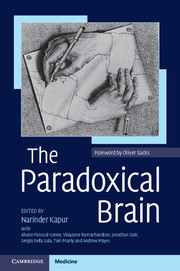Book contents
- Frontmatter
- Contents
- Acknowledgements
- Preface
- Foreword
- Author affiliations
- Abbreviations
- 1 The paradoxical nature of nature
- 2 Paradoxical effects of sensory loss
- 3 Paradoxical functional facilitation and recovery in neurological and psychiatric conditions
- 4 Paradoxes in neurorehabilitation
- 5 The paradoxical self
- 6 Paradoxical psychological functioning in early child development
- 7 Cognitive ageing: a positive perspective
- 8 Paradoxes of learning and memory
- 9 The paradox of human expertise: why experts get it wrong
- 10 Paradoxes in Parkinson's disease and other movement disorders
- 11 Paradoxical phenomena in epilepsy
- 12 Paradoxical creativity and adjustment in neurological conditions
- 13 Paradoxical functional facilitation with noninvasive brain stimulation
- 14 Unexpected benefits of allergies and cigarette smoking: two examples of paradox in neuroepidemiology
- 15 The paradox of autism: why does disability sometimes give rise to talent?
- 16 Paradoxes in creativity and psychiatric conditions
- 17 The paradox of psychosurgery to treat mental disorders
- 18 The paradox of electroconvulsive therapy
- 19 Paradoxes of comparative cognition
- 20 Paradoxical phenomena in brain plasticity
- 21 Immature neurons in the adult brain. Breaking all the rules
- 22 The paradoxical hippocampus: when forgetting helps learning
- 23 Paradoxical effects of drugs on cognitive function: the neuropsychopharmacology of the dopamine and other neurotransmitter systems
- 24 The paradoxical brain – so what?
- Index
Preface
Published online by Cambridge University Press: 05 December 2011
- Frontmatter
- Contents
- Acknowledgements
- Preface
- Foreword
- Author affiliations
- Abbreviations
- 1 The paradoxical nature of nature
- 2 Paradoxical effects of sensory loss
- 3 Paradoxical functional facilitation and recovery in neurological and psychiatric conditions
- 4 Paradoxes in neurorehabilitation
- 5 The paradoxical self
- 6 Paradoxical psychological functioning in early child development
- 7 Cognitive ageing: a positive perspective
- 8 Paradoxes of learning and memory
- 9 The paradox of human expertise: why experts get it wrong
- 10 Paradoxes in Parkinson's disease and other movement disorders
- 11 Paradoxical phenomena in epilepsy
- 12 Paradoxical creativity and adjustment in neurological conditions
- 13 Paradoxical functional facilitation with noninvasive brain stimulation
- 14 Unexpected benefits of allergies and cigarette smoking: two examples of paradox in neuroepidemiology
- 15 The paradox of autism: why does disability sometimes give rise to talent?
- 16 Paradoxes in creativity and psychiatric conditions
- 17 The paradox of psychosurgery to treat mental disorders
- 18 The paradox of electroconvulsive therapy
- 19 Paradoxes of comparative cognition
- 20 Paradoxical phenomena in brain plasticity
- 21 Immature neurons in the adult brain. Breaking all the rules
- 22 The paradoxical hippocampus: when forgetting helps learning
- 23 Paradoxical effects of drugs on cognitive function: the neuropsychopharmacology of the dopamine and other neurotransmitter systems
- 24 The paradoxical brain – so what?
- Index
Summary
The study of the human brain has been variously referred to as ‘the last great frontier’, or a challenge equivalent to that of understanding the universe. Cosmology and neuroscience, in fact, probably have some things in common. Our galaxy, the Milky Way, has thousands of millions of stars, and some commentators have conjectured that the number of stars in the Milky Way may be similar to the number of cells in the human brain. In the past two decades, imaging and sensing technologies have transformed both the field of neuroscience and the field of cosmology. Perhaps a more interesting analogy is in the realm of awareness and human consciousness. With our current awareness mechanisms, we are usually only aware of a tiny amount of cognitive activity that mediates human behaviour – many cognitive and perceptual inferences take place at an unconscious level, we often fail to realize how our perceptions and beliefs may not be completely based on reality, and we often fool ourselves into believing that we have free will and full responsibility for all our thoughts and actions (Frith, 2007). Similarly, in the case of cosmology, with our eyes alone we are only aware of a tiny part of our galaxy, and if we were to take our perceptions literally, we would fall for the simple delusion that the sun moves round the earth.
- Type
- Chapter
- Information
- The Paradoxical Brain , pp. xi - xiiiPublisher: Cambridge University PressPrint publication year: 2011

